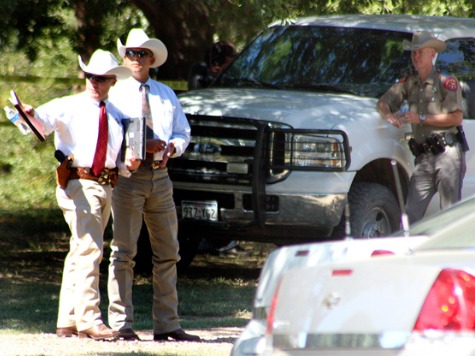
AUSTIN, TEXAS–Areas in Texas near the Mexican border are of “special concern” in regards to public corruption, according to the Texas Department of Public Safety (DPS). This statement was given to Breitbart Texas in response to a recently published article in the Rio Grande Guardian. The article, “Texas Ranger: Valley is No More Corrupt than any other Region,” asserted that a Texas Ranger Major named Shawn Palmer had claimed the border area in Texas known as the Rio Grande Valley was no more corrupt than the rest of the state. This assertion contradicted Texas Attorney General and Republican gubernatorial candidate Greg Abbott’s assertion that areas of Texas near the Mexico border had more public corruption than the rest of the state. Some adversaries of Abbott then used the article to attack the Attorney General’s statements.
Breitbart Texas specifically asked DPS Spokesman Tom Vinger if the Rio Grande Guardian article was correct in their characterization of Texas Ranger Major Palmer’s words. Vinger responded, “The article you reference inaccurately states Major Palmer: ‘does not believe there is any more public corruption in the Rio Grande Valley than there is in other parts of Texas.’ That is not an accurate reflection of the views of the major or Department of Public Safety.” DPS Spokesman Vinger also indicated that the Rio Grande Guardian had incorrectly identified Texas Ranger Major Palmer. They identified him as “a Major with the Texas Ranger’s Public Corruption Unit,” however, that is not accurate. DPS Spokesman Vinger said, “Major Palmer oversees Rangers in Company D, which covers most of south Texas and much of the border Region. There are Rangers who specialize in public corruption in each of the six Ranger companies across the state.”
DPS Spokesman Vinger wrote:
It is certainly true that the criminal activity perpetuated by drug trafficking, including public corruption, is not limited to the border region. In fact, it affects the entire nation. However, as DPS has outlined in our Threat Overview, corruption of law enforcement officials along the Texas-Mexico border is of special concern, including in the Rio Grande Valley area.
Several examples were provided by the DPS’s Vinger, he wrote:
Since October 1, 2004, more than 140 CBP employees have been arrested or indicted for acts of corruption, including drug smuggling, alien smuggling, money laundering, and conspiracy.
In January 2013, a Texas Highway Patrol Trooper stopped a vehicle in Carson County driven by a police officer from Indiana. The Trooper searched the vehicle and its contents and located marijuana concealed inside the lining of the suspect’s luggage. Further search revealed additional containers of marijuana, 10 chocolate bars believed to contain THC, and several grams of suspected heroin located underneath the passenger seat.
In December 2012, four law enforcement officers in Hidalgo county were charged on allegations that they assisted drug traffickers in smuggling drug loads into Texas.
In April 2011, the former Chief of the Sullivan City Police Department pleaded guilty to federal charges regarding his role in a drug trafficking operation. He helped drug traffickers cross loads of marijuana by alerting them to the location of U.S. Border Patrol units. He also directed his officers to other locations to avoid them interfering with or intercepting the traffickers as they ran the loads of marijuana from the river into Sullivan City.
The assertion by Attorney General Abbott that public corruption occurs in greater frequency near the Mexico border has largely been used by left-leaning media and other Democratic Party supporting groups as somehow indicating a hatred or lack of respect towards Latino communities in the region–regardless of the factual accuracy of Abbott’s remarks.
One of the most recent examples of controversy surrounding the remarks came when a Lubbock, Texas city councilman attacked Abbott for supposedly making unfair statements about Hispanic communities in Texas. In that instance, Councilman Victor Hernandez reportedly attacked Abbott for using either a Mexican restaurant or his Hispanic wife of over thirty years–or both–as being political props. Councilman Hernandez then came under fire himself for the extent of his remarks and their appearing to indicate racial separatist views on the part of the councilman.
Follow Brandon Darby on Twitter @BrandonDarby

COMMENTS
Please let us know if you're having issues with commenting.